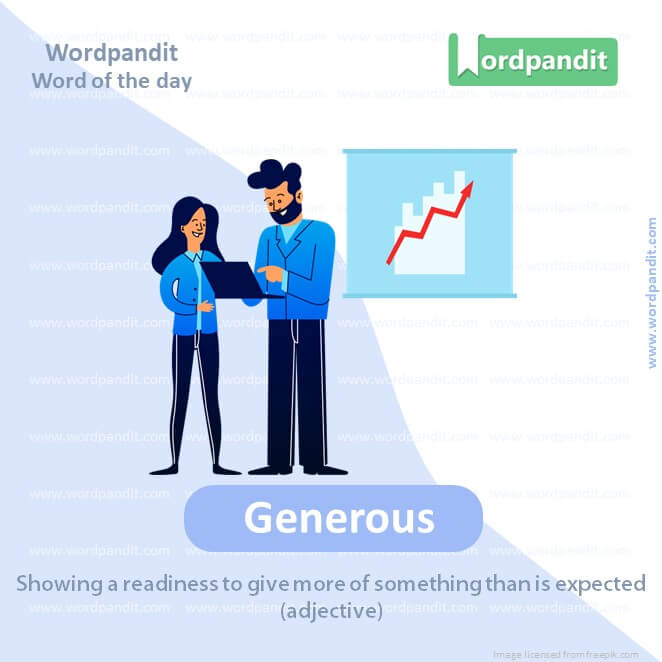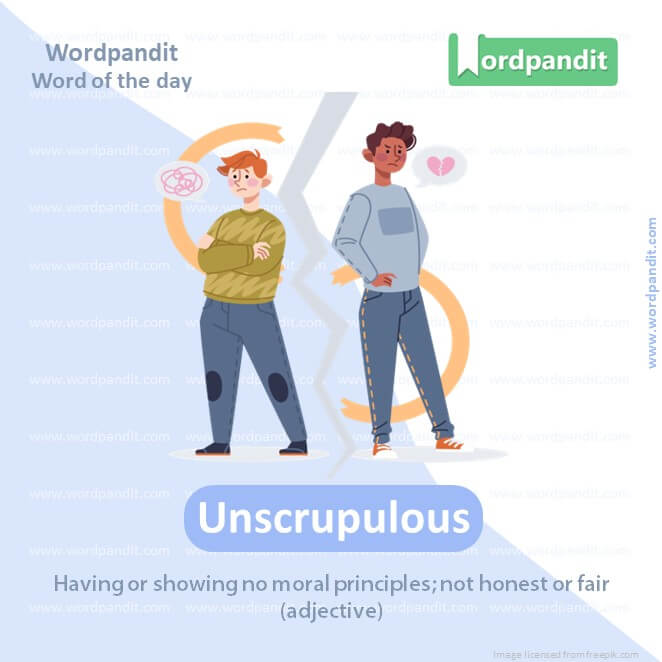Daily Vocabulary Words: List of Daily Used Words
Hi there. Welcome to this special section @ Wordpandit.
Our endeavour here is straightforward: highlighting important daily vocabulary words, you would encounter in The Hindu. This is your repository of commonly used words; essentially, we are posting a list of daily used words. Hence, this has significant practical application as it teaches you words that are commonly used in a leading publication such as The Hindu.
Visit the website daily to learn words from The Hindu.

WORD-1: Infiltrated
CONTEXT: He had infiltrated into the Kashmir Valley in 1993 and was arrested a year later. He was in Jammu jail with Masood Azhar, founder of the JeM, till 2010, officials said.
SOURCE: The Hindu
EXPLANATORY PARAGRAPH: Imagine you have a big bowl of water and you put a sponge inside. Slowly, the water goes inside the sponge. That’s kind of like ‘infiltrated’. It’s when something or someone sneaks in or goes into something else quietly.
MEANING: To enter or become established in gradually or stealthily (verb).
PRONUNCIATION: in-FIL-tray-ted
SYNONYMS: Sneaked, slipped, permeated, penetrated, pervaded, invaded, insinuated.
USAGE EXAMPLE:
1. The water infiltrated the soil after the rain.
2. Spies infiltrated the enemy’s base.
3. The ideas of the group infiltrated mainstream culture.
4. They infiltrated the meeting to gather information.

WORD-2: Siege
CONTEXT: Seven IAF personnel were killed when four JeM terrorists sneaked into the Pathankot Air Force Station on January 2, 2016. The siege went on for three days.
SOURCE: The Hindu
EXPLANATORY PARAGRAPH: Imagine some toy soldiers surrounding a toy castle and not letting anyone go in or out. That’s called a ‘siege’. It’s when an army surrounds a place to try to take control of it.
MEANING: A military operation in which enemy forces surround a town or building, cutting off essential supplies (noun).
PRONUNCIATION: seej
SYNONYMS: Blockade, encirclement, beleaguerment, confinement, investment, surround, lock-in.
USAGE EXAMPLE:
1. The castle was under siege for three months.
2. The city prepared for a long siege.
3. The army laid siege to the enemy’s fortress.
4. During the siege, food supplies ran low.

WORD-3: Tentative
CONTEXT: Sri Lanka on October 11 welcomed China’s tentative agreement to a debt restructure, as the island nation works to restore its ruined finances after suffering its worst-ever economic crisis.
SOURCE: The Hindu
EXPLANATORY PARAGRAPH: Imagine you’re trying to touch something but you’re not sure if it’s hot, so you touch it very lightly and carefully. That’s like being ‘tentative’. It means you’re not sure or you’re doing something carefully because you’re uncertain.
MEANING: Not certain or fixed; done without confidence (adjective).
PRONUNCIATION: TEN-tuh-tiv
SYNONYMS: Uncertain, hesitant, cautious, wary, doubtful, unsure, indecisive.
USAGE EXAMPLE:
1. She gave a tentative smile.
2. He made a tentative step towards reconciliation.
3. The team had a tentative agreement to meet again.
4. Her voice was tentative and shy.

WORD-4: Generous
CONTEXT: That decision cleared the way for a staged $2.9 billion International Monetary Fund bailout, conditional on austerity measures such as tax hikes and cuts to generous public subsidies.
SOURCE: The Hindu
EXPLANATORY PARAGRAPH: Think of someone who shares their toys, candy, or helps others a lot. That person is ‘generous’. It means giving more than what’s expected or being kind-hearted.
MEANING: Showing a readiness to give more of something than is expected (adjective).
PRONUNCIATION: JEN-er-us
SYNONYMS: Kind-hearted, magnanimous, charitable, benevolent, big-hearted, giving, open-handed.
USAGE EXAMPLE:
1. He was generous with his time, helping everyone.
2. Her generous donation helped the school.
3. It was very generous of you to share your lunch.
4. They praised her generous spirit.

WORD-5: Unscrupulous
CONTEXT: Reuters has reported that DEG and EG have been used by unscrupulous actors as a substitute for propylene glycol because they are cheaper.
SOURCE: The Hindu
EXPLANATORY PARAGRAPH: If someone is willing to do bad things to get what they want without thinking about others, they are ‘unscrupulous’. It means not being honest or fair.
MEANING: Having or showing no moral principles; not honest or fair (adjective).
PRONUNCIATION: un-SKROO-pyuh-lus
SYNONYMS: Dishonest, unprincipled, deceitful, immoral, corrupt, unethical, shady.
USAGE EXAMPLE:
1. The salesman was unscrupulous and deceived many customers.
2. She was wary of the unscrupulous tactics used in politics.
3. Unscrupulous traders took advantage of the situation.
4. The company was fined for its unscrupulous practices.
WORD-6: Integrity
CONTEXT: India on October 11 said a multilateral rules-based international order, along with sincere respect for sovereignty and territorial integrity remains the foundation for reviving the Indian Ocean as a strong community, in a veiled attack on China which is flexing its muscles in the region.
SOURCE: The Hindu
EXPLANATORY PARAGRAPH: Think of someone who always does the right thing, even when no one is watching. That person has ‘integrity’. It means being honest and having strong moral values.
MEANING: The quality of being honest and having strong moral principles (noun).
PRONUNCIATION: in-TEG-ri-tee
SYNONYMS: Honesty, morality, virtue, righteousness, uprightness, honor, trustworthiness.
USAGE EXAMPLE:
1. He is a man of great integrity.
2. She showed her integrity by returning the lost wallet.
3. Integrity is important in any profession.
4. The company values integrity above all else.
WORD-7: Littoral
CONTEXT: He said that in the resurgence of Asia, and global rebalancing, the Indian Ocean holds a central position, playing a crucial role in the development and prosperity of the littoral nations, by supporting trade and sustaining livelihoods, offering immense possibilities of connectivity and resource utilisation.
SOURCE: The Hindu
EXPLANATORY PARAGRAPH: Imagine going to a beach where the water meets the sand. That area is called the ‘littoral’ zone. It’s the part of the land that’s close to the sea or a lake.
MEANING: Relating to or situated on the shore of the sea or a lake (adjective).
PRONUNCIATION: LIT-uh-rul
SYNONYMS: Coastal, beachfront, shore, shoreline, seaside, waterfront, beachy.
USAGE EXAMPLE:
1. Many species live in the littoral zone of the ocean.
2. The littoral region is under threat due to rising sea levels.
3. Tourists flocked to the littoral areas during summer.
4. The hotel offers a stunning littoral view.
WORD-8: Utilisation
CONTEXT: He said that in the resurgence of Asia, and global rebalancing, the Indian Ocean holds a central position, playing a crucial role in the development and prosperity of the littoral nations, by supporting trade and sustaining livelihoods, offering immense possibilities of connectivity and resource utilisation.
SOURCE: The Hindu
EXPLANATORY PARAGRAPH: Imagine you have a toy and you play with it. When you play with it, you’re using it or ‘utilising’ it. It means to make use of something.
MEANING: The action of making practical and effective use of something (noun).
PRONUNCIATION: yoo-til-eye-ZAY-shun
SYNONYMS: Use, application, employment, exercise, deployment, operation, consumption.
USAGE EXAMPLE:
1. The utilisation of resources should be efficient.
2. New technology has allowed better utilisation of solar energy.
3. The project focuses on the utilisation of waste materials.
4. There’s an increased utilisation of online platforms for education.
WORD-9: Consolidation
CONTEXT: India has a high debt like that of China but the risks associated with it are not as great as that of its northern neighbour, a senior official from the International Monetary Fund has said, advising India in the medium term to have an ambitious fiscal consolidation plan that brings down deficits.
SOURCE: The Hindu
EXPLANATORY PARAGRAPH: Imagine you have lots of small toy blocks and you put them all together to make one big block. That’s ‘consolidation’. It means bringing things together to make them stronger or more effective.
MEANING: The action or process of combining a number of things into a single, more effective or coherent whole (noun).
PRONUNCIATION: kuhm-SO-lih-day-shun
SYNONYMS: Unification, combination, merging, strengthening, solidification, fusion, amalgamation.
USAGE EXAMPLE:
1. The consolidation of the companies led to greater profits.
2. There’s a need for consolidation of our efforts to succeed.
3. After the merger, the next step was consolidation of resources.
4. The new rule is aimed at the consolidation of power.
WORD-10: Reiterated
CONTEXT: She has reiterated that her mental condition and the medication for it does not permit her to continue with the pregnancy.
SOURCE: The Hindu
EXPLANATORY PARAGRAPH: When you say something again and again to make sure everyone understands, you ‘reiterate’. It’s like repeating yourself to make things clear.
MEANING: To say something again for emphasis or clarity (verb).
PRONUNCIATION: ree-IT-uh-ray-ted
SYNONYMS: Repeat, restate, echo, recap, emphasize, retell, reproduce.
USAGE EXAMPLE:
1. He reiterated his commitment to the project.
2. The teacher reiterated the instructions to ensure everyone understood.
3. The president reiterated the importance of peace during his speech.
4. Despite their disagreements, she reiterated her respect for him.
Vocabulary English Words
In the enchanting performance of language learning, ‘vocabulary English words’ make up the musical notes that help us create harmonious communication. Mastering these words can seem like an arduous task at times; however, using the right learning strategies can make the process of learning ‘vocabulary English words’ smooth and enjoyable.
A crucial principle for learning ‘vocabulary English words’ is to focus on understanding, rather than memorizing. Engaging with varied materials such as novels, news articles, podcasts and digital content will expose you to a wide range of words in different contexts, giving a deeper insight into their meaning and usage.
Employing memory-enhancing techniques can significantly aid in the learning of ‘vocabulary English words’. Tools such as flashcards, language-learning apps, and mnemonic strategies ensure an effective and long-term learning experience. Mnemonic devices, linking words with personal and relatable stories or images, can help in creating better associations and improving recall.
Practice plays a vital role in mastering ‘vocabulary English words’. Using the new words in your routine conversations, written correspondence, or even digital interactions adds a practical aspect to your learning, making these words a part of your active vocabulary.
Furthermore, leisure activities such as crosswords, word games, or simple vocabulary quizzes are effective ways to make the learning of ‘vocabulary English words’ fun and interactive.
To conclude, the journey of learning ‘vocabulary English words’ demands a multi-faceted approach woven into our daily life. A balanced mix of understanding, usage of memory-enhancement tools, active application, and leisure activities can considerably ease the process of mastering ‘vocabulary English words’. Remember, each word learned is a tiny victory, bringing you one step closer to impeccable fluency and articulate expression in the beautiful symphony of the English language.











